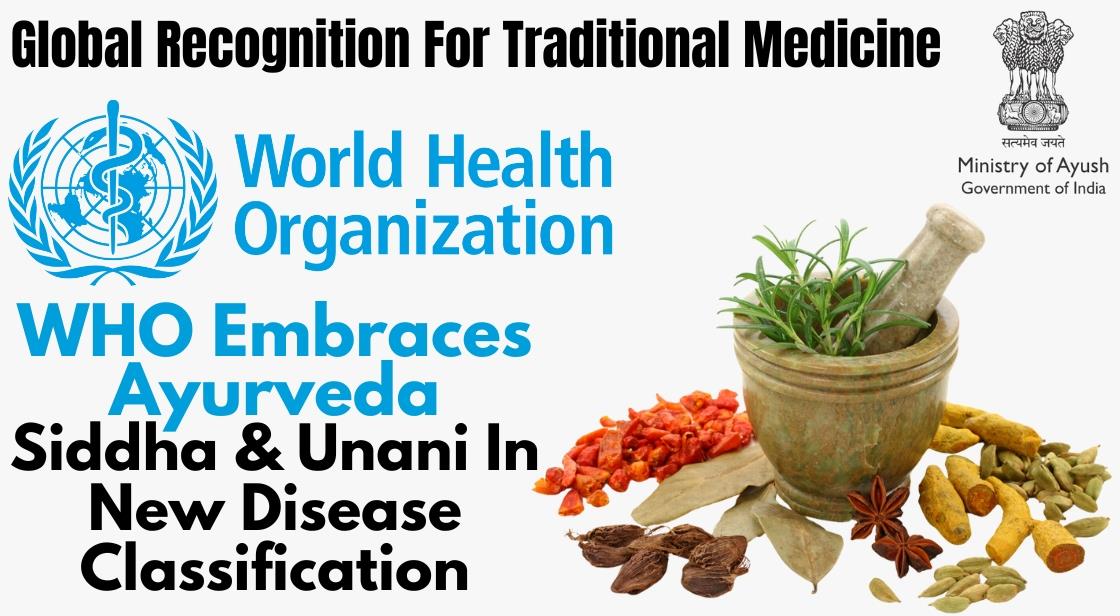WHO Embraces Ayurveda, Siddha, and Unani in New Disease Classification

News Synopsis
In a landmark move, the World Health Organization (WHO) has officially welcomed Traditional Medicine (TM) into its fold. On Wednesday, the WHO launched the Traditional Medicine Morbidity codes of Ayurveda, Siddha, and Unani Chapter as Module 2 of the International Classification of Diseases (ICD-11).
This momentous occasion marks a significant step towards global recognition and integration of Traditional Medicine into mainstream healthcare systems.
Unveiling the Pathway to Inclusion:
The launch ceremony in Delhi witnessed a keynote address by Vaidya Rajesh Kotecha, Secretary Ayush, who traced the remarkable journey of TM2, highlighting the dedication and effort invested in reaching this pivotal milestone. He revealed the final draft of the module, comprising 529 unique codes distributed across 18 chapters.
Notably, the module introduces two distinct types of terminologies: Traditional Medicine Disorder and Traditional Medicine Pattern, paving the way for a comprehensive and nuanced understanding of TM diagnoses.
Building Bridges Between Worlds:
Dr. Roderico H. Ofrin, the WHO Representative to India, emphasized the significance of the Global Traditional Medicine Summit held in Gandhinagar, Gujarat. He recalled the crucial declaration made during the summit, emphasizing the need for standardized documentation for Traditional Chinese, Indian, and Modern (TCIM) policies. This underscores the international collaboration and recognition driving the integration of TM into global healthcare discourse.
Impact Beyond Borders: The inclusion of TM data and terminology in the ICD-11 has far-reaching implications:
-
Global Uniformity: This move establishes a standardized vocabulary for defining diseases within Ayurveda, Siddha, and Unani systems, fostering seamless communication and knowledge exchange among practitioners worldwide.
-
Data-Driven Decisions: By incorporating TM data into health information systems, researchers and policymakers gain valuable insights into the prevalence and management of diseases addressed by TM, enabling informed decision-making for public health initiatives.
-
Strengthening Healthcare Systems: Integration of TM codes can be leveraged to expand India's public healthcare delivery system, enhance research efforts, broaden Ayush insurance coverage, and streamline policy development around TM practices.
-
Setting a Global Precedent: The TM2 module serves as a model for other WHO member countries considering the inclusion of their own traditional medical systems into the ICD-11. This paves the way for a more inclusive and diverse global healthcare landscape.
A Glimpse into the Codes:
The TM2 module encompasses a wide range of conditions, including infectious diseases like malaria and lifestyle diseases like chronic insomnia. It even recognizes conditions common across all three systems, such as vertigo, with distinct names in each practice: Bhramaha in Ayurveda, Ajal Kirkrippu in Siddha, and Sadra-o-Dwar in Unani. This showcases the ability of the module to bridge the gap between diverse TM traditions while maintaining their unique identities.
The launch of the TM2 module marks a crucial turning point in the global recognition and acceptance of Traditional Medicine. It paves the way for greater research, standardization, and integration of these ancient practices into mainstream healthcare systems, ultimately benefiting patients and healthcare providers worldwide.
ICD Series: A Global Framework for Disease Classification
The WHO, through its International Classification of Diseases (ICDs) series, classifies diseases internationally. Historically, global disease data has been primarily based on healthcare practices diagnosed through modern biomedicine. This initiative expands the classification to include data and terminology related to Ayush systems such as Ayurveda, Siddha, and Unani.
Ministry of Ayush's Role and Collaborative Efforts
The Ministry of Ayush has played a pivotal role in this initiative, having already developed the Code for Ayurveda, Siddha, and Unani Medicine through the National Ayush Morbidity and Standardised Electronic Portal (NAMSTE). The collaboration with WHO has resulted in the categorization of data and terminology related to diseases based on Ayush systems under the TM2 module of the ICD11 series.
You May Like









